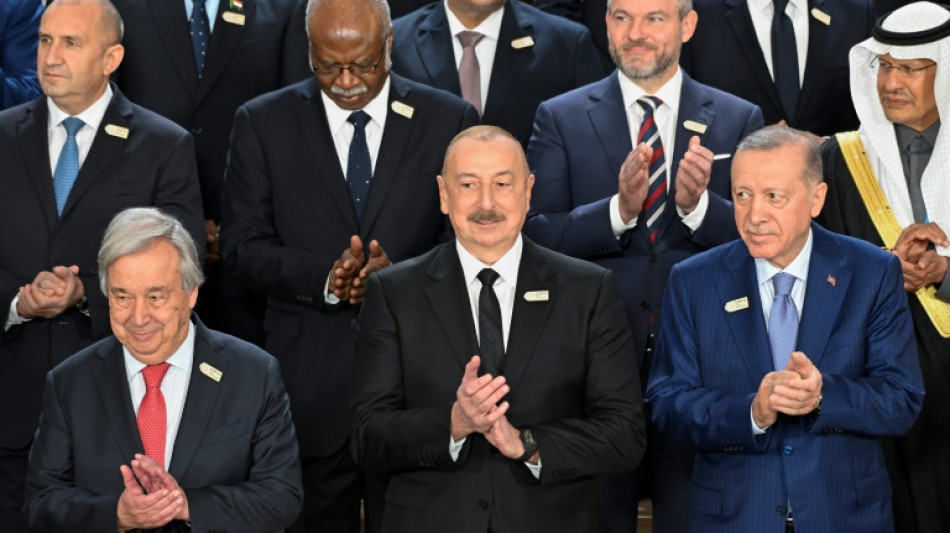
Azerbaijan defends fossil fuels at COP29 as big names skip summit

The host of the UN climate summit in Azerbaijan on Tuesday defended fossil fuels and the right of countries to exploit them as dozens of world leaders arrived for the COP29 conference.
More than 75 leaders are expected but the heads of top polluting nations are skipping the crunch climate talks, where the impact of Donald Trump's election victory is being digested.
Just a handful of leaders from rich G20 nations -- which account for nearly 80 percent of the world's planet-heating emissions -- are expected over two days in Baku.
In the host's opening address, President Ilham Aliyev said Azerbaijan had been subject to "slander and blackmail" for its use of fossil fuels and that no country should be judged for its natural resources.
"Quote me that I said that this is a gift of the God, and I want to repeat it today here at this audience," Aliyev told delegates.
"Oil, gas, wind, sun, gold, silver, copper, all... are natural resources and countries should not be blamed for having them and should not be blamed for bringing these resources to the market, because the market needs them."
"People need them."
Joe Biden, Xi Jinping, Narendra Modi, Emmanuel Macron and Olaf Scholz are among G20 leaders missing the event, where uncertainty over future US climate action overshadowed the opening day.
UK Prime Minister Keir Starmer, one of the higher profile leaders attending, will unveil an "ambitious" update to the UK's climate goals later today, and said he wanted his country "to show leadership on the climate challenge."
And Washington's top climate envoy John Podesta is seeking to reassure countries in Baku that Trump's re-election will not end US efforts on global warming, even if the issue will be "on the back burner".
- 'Tough COP' -
The top priority at COP29 is landing a hard-fought deal to boost funding for climate action in developing countries.
These nations -- from low-lying islands to fractured states at war -- are least responsible for climate change but most at risk from rising seas, extreme weather and economic shocks.
Some are pushing for the existing pledge of $100 billion a year to be raised ten-fold at COP29 to cover the future cost of their nations shifting to clean energy and adapting to climate shocks.
COP29 president Mukhtar Babayev, a former oil executive, told negotiators on Monday that trillions may be needed, but a figure in the hundreds of billions was more "realistic".
That has angered developing countries and NGOs, who argue rich countries and historical emitters owe a "climate debt."
Adonia Ayebare, the Ugandan chair of a bloc that groups over 100 mostly developing countries and China, said they had already rejected a draft deal on the table at Baku.
"We cannot accept it and we asked them to produce a new text," he told AFP.
Nations have haggled over this for years, with disagreements over how much should be paid, and who should pay it.
"Countries are divided. There is a lack of trust," said Fernanda Carvalho, global climate and energy policy lead at WWF.
That "will be reflected in every room of those negotiations," she told AFP.
- Deal a must -
Developing countries warn that without adequate finance, they will struggle to offer ambitious updates to their climate goals, which countries are required to submit by early next year.
The small group of developed countries that currently contributes the money wants the donor pool expanded to include other rich nations and top emitters, including China and the Gulf states, something firmly rejected by Beijing.
UN Secretary General Antonio Guterres on Tuesday said developing nations "must not leave Baku empty-handed".
"A deal is a must," he said.
UN climate chief Simon Stiell has tried to convince rich countries that climate finance is not charity, but a downpayment on a safer, wealthier planet.
"The climate crisis is fast becoming an economy killer," he warned.
He also sought to reassure the talks that recent "political events" would not derail global climate diplomacy.
"Our process is strong. It's robust, and it will endure."
Around 50,000 people are attending summit in Azerbaijan, a petrostate wedged between Russia and Iran, including the leaders of many African, Asian and Latin American countries beset by climate disasters.
A.dCosmo--PV
